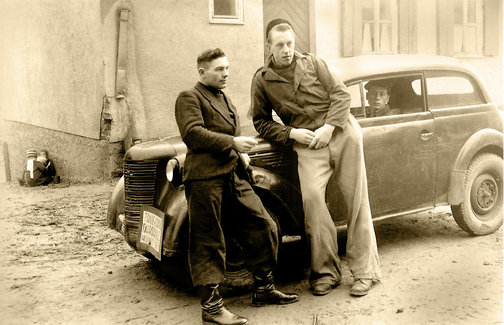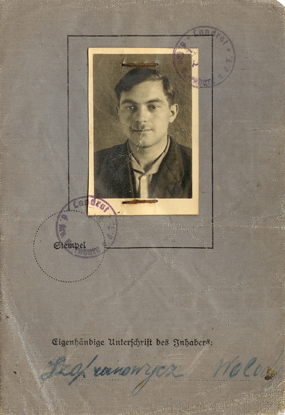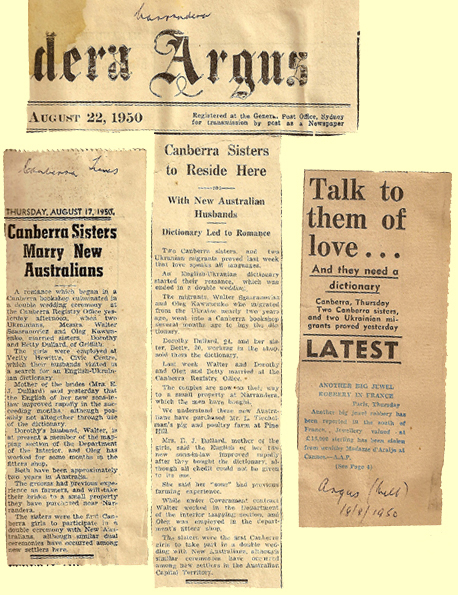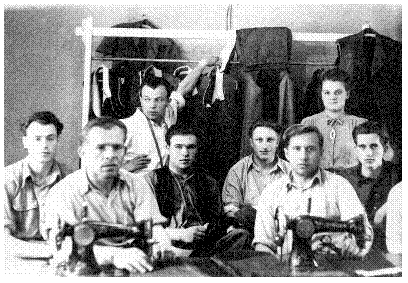8/8/06
Olga, I found your site as I was researching Dad. Thank you so much for it. Keep up the good work!
Where was Dad after the war?
It's funny how these questions about your parents only occur to you after they're dead. I knew Dad was a Ukrainian, drafted into the Red Army. He was captured on the first day of the Nazi invasion of the Soviet Union, on 22 June 1941. After that, he told me, it was a German prison camp. The war ended in May 1945 - should have been great news. But like other POWs he feared prison by Stalin for treason. After all, he had allowed himself to be captured. He was interrogated by SMERSH, at one point forced to dig his grave--a gun to his head. When he got the chance, he squeezed under the barbed wire and made his way into the American zone, changing his name as he went.
Dad was a DP until 1948, when he came to Australia and married Mum. Nearly three years in limbo. But where? What was it actually like? What thoughts went through his head? Despair? Frustration? Hope?
It's hard to imagine Europe from here. Australia is sunny and bright; its buildings new and its people naively optimistic. Returning Aussie soldiers were met by nice ladies at the docks, with cups of tea and lamington cakes: Did you have a nice war? It has small experience of ancient quarrels, complex cohabitations and invasion; history happens someplace else. It's even harder to imagine a Europe destroyed by bombs, people brutalized by want and daily cruelties -- traumatized by the prospect of random death. Scarred. Dad had to put all that behind him. This is Australia mate. Don't wanna hear about all that wog stuff.
But Dad wrote poems as he grew old. Poems in Ukrainian. None of us kids read Ukrainian. For all these years, they might as well have been written with invisible ink. A long time after he died, I finally became curious about them. I asked a nice Ukrainian lady to translate some. He writes about Ukraine, his mother, the war; but moslty about lost loves. And he mentions his DP camp. Korenburg. Korenburg? Must be easy to find in any atlas. Nope. Konigsberg? That's in the book, but not likely. Did he forget the name? Did he make it all up?
I stumbled onto the DP Camps site. Wow. So much stuff. Gotta love modern technology. What fine people -- those generous souls who made it. Let's see now. Dad was in the American zone. Not that many camps. How hard could it be? But no Korenburg.
Sunday afternoon. Kids outside playing. I'm on the computer, again. Searching. Hmm. 'DP Camps in Germany'. Maybe the K was a C. Cammer? No that's the British zone. Not even close. Coburg? That's closer. But nope. Cornberg? Doubtful. Hang on, there's a photo album of Cornberg, a fat photo album of Cornberg -- posted by Judy Hrynenko. Nothing else to do!
I almost fall out of my chair. Slide 38: "A lecture in the course for drivers." That's Dad, surely. The guy giving the class! Dad once said that in the camp "I was lecturer." I pull out some old photos Dad had. The buildings in the background look similar, those shutters are the same. And there's a door with those V-pattern slats. And here he is about that time in another photo fatter in the face than normal but he looks just like the man giving the class. What are the chances? What are the chances? Doubt creeps in. 'Cornberg' isn't that close to 'Korenburg'. I email my brothers. We all believe we have found the camp, pretty much. And the photographs are superb. But...
Mum died this winter. She married Dad in a double wedding in 1950; her sister also married a Ukrainian -- two Australians marry two Ukrainians. It made the newspapers: "Canberra Sisters Marry New Australians" and "Talk to them of love -- and they need a dictionary."
Among Mum's papers I found a thin yellow sheet, spotted and ravaged at its edges: Cornberg.
Thank you Judy. Thank you Olga.
Peter Shafron/Szafranowycz Email: [email protected]
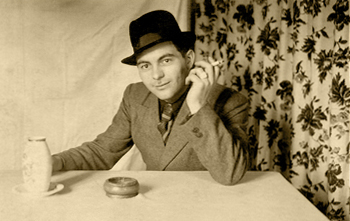
1946 or 1947
TO WHOM IT MAY CONCERN
21st January 1947.
This is to certify that Szafranowycz Wolodymyr, a registered Displaced Person of Camp 566, werked (sic) in the Camp as driver school teacher from November 1945 to December 1946.
He proved himself to be a hard working honest man.
D. Davies
Welfare Officer
UNRAA Area Team 1023
DP Camp 566 Cornberg
4/17/12
Hi Olga.
Last year I came across your site and found my way to the Cornberg component. My wife's parents were at Cornberg before eventually arriving in Australia in 1948 as post war refugees. They have a similar history to many others and Judith Hyrnenko's photos contained one which included my late father-in-law.
My wife and I are hoping to travel to Ukraine later in the year and were hoping to see what we can do to find the location of the birthplaces of her now deceased parents. There are some difficulties as there are probable name changes due to the usual issues Ukrainians faced with Russian authorities, etc.
Below is the photo from camp. Maybe someone knows something about them. This is of course getting more difficult as most of these people are now in their 80s or more.
Cornberg Anderson My in-laws names are Alexander and Maria Karpenko and they were married during their internment I seem to recall in 1946? Alexander is the man directly in front of the sewing machine on the right side of the photo and we think the woman behind may be Maria.
Geoff
Anderson [email protected]
